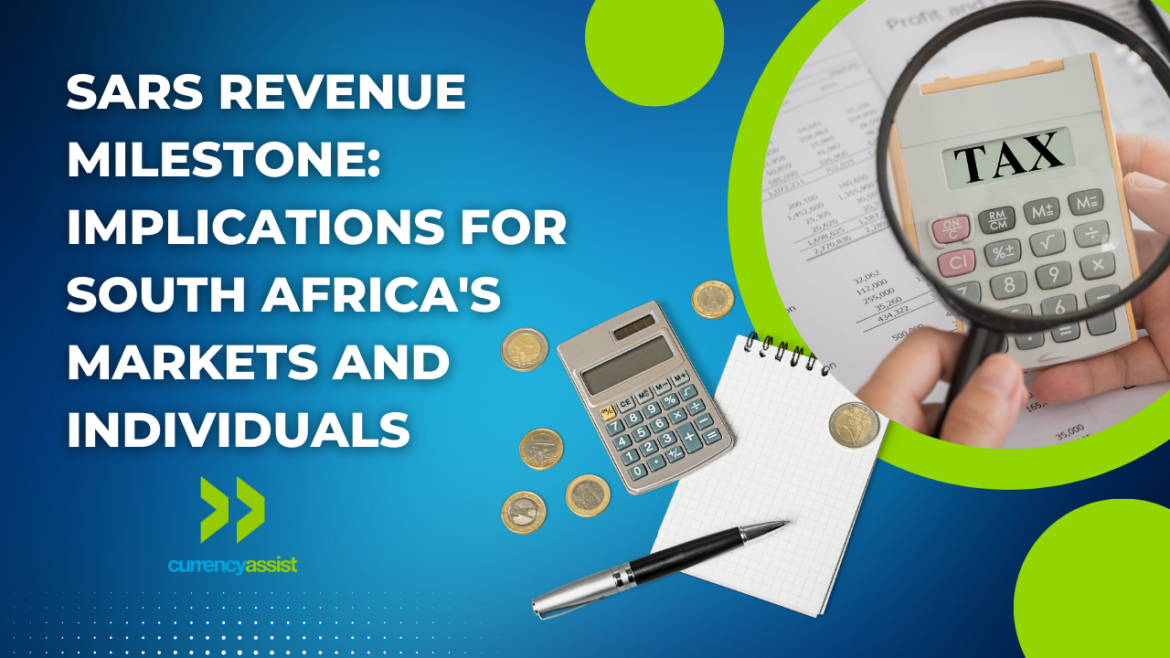The latest tax revenue figures released by the South African Revenue Service (SARS) offer valuable insights into the state of South Africa’s economy and its implications for both financial markets and individual taxpayers. Let’s explore how these numbers impact various sectors and citizens across the nation.
Economic Context
South Africa has been grappling with persistent challenges like load shedding and logistical disruptions, exacerbating the strain on an already fragile economy. Despite these hurdles, SARS collected a gross tax revenue of R2.155 trillion for the 2023/24 financial year, marking a notable 4.2% year-on-year growth.
Market Dynamics
Investor Sentiment
The robust tax revenue figures could bolster investor confidence in South Africa’s economic resilience. Positive revenue outcomes signal stability and effective governance, potentially attracting domestic and foreign investors to the country’s financial markets. At the very least, this can help mitigate some of the uncertainty in the market with the upcoming elections.
Sectoral Impact
The revenue report sheds light on sector-specific trends, with contrasting dynamics observed in personal and corporate income taxes. While personal income tax demonstrated healthy growth driven by improved employment, corporate income tax witnessed a decline, particularly notable in the mining sector. These trends could influence investor sentiments towards different industries, impacting stock performances and investment strategies.
Implications for Individuals
Fiscal Policy and Budget Allocation
The revenue surplus relative to projections provides policymakers with additional fiscal manoeuvrability. Government officials may consider allocating resources towards priority areas such as infrastructure development, social welfare programs, and economic stimulus initiatives. Taxpayers could benefit from improved public services and targeted support measures aimed at mitigating economic challenges.
Taxpayer Refunds and Cash Flow
The issuance of substantial taxpayer refunds, including support for Small, Medium, and Micro Enterprises (SMMEs) and individuals, injects liquidity into the economy. These refunds serve as a lifeline for businesses and households, particularly during times of financial strain. Increased cash flow could stimulate consumer spending and business investment, fuelling economic activity.
Future Outlook
Renewable Energy Incentives
Recent rulings clarifying tax incentives for renewable energy projects present opportunities for individuals to engage in sustainable investments. With the broader societal shift towards environmental consciousness, individuals can leverage these incentives to participate in renewable energy initiatives, fostering both environmental stewardship and financial growth.
Enforcement Measures and Compliance
SARS’ proactive stance against tax fraud and non-compliance reinforces the importance of regulatory adherence. Taxpayers and tax practitioners face heightened scrutiny, necessitating compliance with tax regulations. Enhanced enforcement measures promote fairness and integrity within the tax system, fostering a level playing field for businesses and individuals.
In conclusion, SARS’ record tax revenue collection reflects resilience amidst economic challenges, with significant implications for South Africa’s financial markets and individual taxpayers. Investor sentiment may be buoyed by positive revenue outcomes, while taxpayers stand to benefit from increased fiscal flexibility and targeted support measures. Looking ahead, regulatory clarity, enforcement efforts, and strategic investments will play pivotal roles in shaping South Africa’s economic trajectory and fostering inclusive growth.

